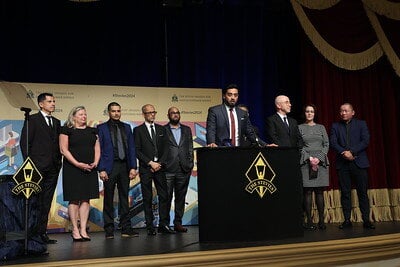 Mercedes-Benz South Africa of East London, Eastern Cape received the Stevie Award for Corporate Social Responsibility Program of the Year in the Middle East and Africa in The 2010 International Business Awards. (The final entry deadline for this year's IBAs is June 8 - see the entry kit online.) Here's the story of Mercedes-Benz's efforts to combat the spread of HIV/AIDS in South Africa.
Mercedes-Benz South Africa of East London, Eastern Cape received the Stevie Award for Corporate Social Responsibility Program of the Year in the Middle East and Africa in The 2010 International Business Awards. (The final entry deadline for this year's IBAs is June 8 - see the entry kit online.) Here's the story of Mercedes-Benz's efforts to combat the spread of HIV/AIDS in South Africa.
In 2007, Sub-Saharan Africa was home to 22 of the 33 million people living with HIV/AIDS. South Africa is the country with the largest number of HIV-infected people in the world (5,7 million plus) with more than 90% of infections affecting the economically active. These statistics were having an adverse impact on South Africa’s small and medium enterprises (SMEs), which employ significant numbers and contribute about 40% to the GDP.
Through the Siyakhana Project Mercedes-Benz South Africa (MBSA) has expanded its globally acknowledged best-practice workplace program to provide HIV/AIDS program support to SMEs and the broader community.
Siyakhana means “to build together” in isi-Xhosam, the local vernacular. In order to achieve the key objectives of the Siyakhana Project, MBSA successfully enlisted the partnership of the Border-Kei Chamber of Business and the Eastern Cape Provincial Department of Health, and obtained financial
support from the German development agency DEG and BroadReach Health Care.
The Siyakhana Project is designed to simultaneously tackle HIV/AIDS at the workplace, in communities, and at the primary healthcare level to ensure a holistic response.
By March 2010 Siyakhana had achieved the following:
- Implementation of comprehensive HIV/AIDS policies and programs in 55 SMEs.
- 595 managers trained on HIV/AIDS in the workplace.
- 164 peer educators trained.
- 85 nurses trained on HIV/AIDS testing and treatment.
- 55 successful workplace HIV voluntary counseling and testing campaigns.
- 9,013 employees trained and counseled.
- 6,980 employees voluntarily testing for HIV.
- Establishment of, and ongoing training support to, a private physician network to manage HIV/AIDS care for SME employees and families.
- 850 HIV-positive patients referred into the treatment program with 150
people on anti-retroviral treatment (as of March 2010). - Capacity building services extended to 12 public-sector primary-healthcare clinics through providing a retired professional nurse and a lay counselor in each clinic, resulting in a 110% improvement in HIV testing rates.
The Siyakhana Project has a built-in monitoring system that tracks project success both quantitatively and qualitatively. Independent external evaluators regularly conduct an evaluation of project performance against operational plans and “best practice.”
Lessons Learned and Future Challenges
The foundation of the Siyakhana Project’s success has been the strong partnerships that MBSA’s HIV/AIDS program has built with the government, the National Union of Metalworkers of South Africa, and community-based organizations.
Organized business involvement is also a key ingredient, and the project showed that SME owners and managers are keen to participate if guidance and hands-on support is provided. Employees are eager to access testing, however confidence building is required.
While the Siyakhana Project has demonstrated how much can be achieved by forming broad-based partnerships involving both private and public sectors, its sustainability will be an ongoing challenge requiring full commitment from all partners.
MBSA’s Promise
Managing HIV and AIDS is a core business for MBSA, and its HIV/AIDS program aims to effectively address the development challenge posed by HIV and AIDS to company employees, their families, business operations, and economic and social development. The workplace program extends universal access to quality prevention, treatment, care, and support to all its employees and their dependents.
MBSA is both a key automotive player and a social partner. It has played a significant role in industrial and corporate socio-economic transformation, and continues to do so today. This is evident in the fact that despite the recession, it maintained its corporate social investment spend in excess of R20 million per annum, and that it is a leader amongst its peers in skills development, employee health and well-being programs, and employee benefits.
About Dr. Hansgeorg Niefer
Dr. Hansgeorg Niefer, a qualified professional engineer, started his career with Daimler AG in 1986 at the Sindelfingen plant in Germany. He joined the South African operation in 2002 to head up the manufacturing activities in East London. Dr Niefer has been chairman of the local group of companies since 2005 and has recently been redeployed to head up the Daimler plant in Berlin. He notes, however, that one of his proudest achievements during his tenure in South Africa has been the group's success in the battle against HIV and AIDS, and the opportunity to provide advocacy and support programmes for SMEs, suppliers and retailers alike, as well as assisting communities impacted by HIV and AIDS.
About Mercedes-Benz South Africa
The Mercedes-Benz group of companies in South Africa was established in 1954. Mercedes-Benz South Africa (MBSA) manufactures Mercedes-Benz and Mitsubishi vehicles at its plant in East London, Eastern Cape Province. MBSA is a wholly owned subsidiary of Daimler AG and is one of the largest automotive groups in South Africa.












